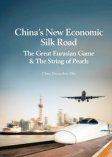China Moves in on Balkans after EU Promotes “Connectivity” rather than Membership

The recent EU summit in Sofia, Bulgaria is being followed in just a few weeks by the Chinese supported Cooperation between China and Central and Eastern Europe (CEEC) in the same city and with similar agendas – discussing the future of the Balkans and promoting investment and finance.
The EU summit concentrated in part on the potential for the enlargement of the EU to include the Balkan states of Albania, Bosnia and Herzegovina, Serbia, Montenegro, Macedonia and Kosovo. Discussions have been going on for well over a decade, and the summit was the first of its kind to address the issue in 15 years.
Trade from the EU and the Balkans amounts to some 73% of the Balkans total, while the EU also provides some 72% of foreign investment into the area. However, progress on formalizing membership relations between the EU and the Balkans have proved elusive. The region is complex, with traditional Orthodox views and to some extent political views heavily influenced by Moscow rubbing up against Muslims with alliances more aligned to Ankara and Mecca.

European Union leaders expressed determination to “strengthen and intensify” their ties to the Western Balkans, but they dampened any hopes of a quick move to allow any new countries into the bloc. “The EU reaffirms its unequivocal support for the European perspective of the Western Balkans,” it said in a joint declaration on May 17 following the summit. The declaration said the EU was “determined to strengthen and intensify its engagement at all levels” and vowed to “substantially” enhance “connectivity in all its dimensions: transport, energy, digital, economic, and human.”
The EU has come to understand it has neglected the Balkans over the last decade, and has attempted to lay a de facto claim, an issue picked up on by the summit host, Bulgarian Prime Minister Byoko Borisov. He stated “The EU bloc does not want other geostrategic players to enter and enhance their quite high influence they already have.” That was an allusion to increasing influence on the Balkans from Russia, Turkey, the Arab States, and China. However, faced with stalled reform processes, the EU came to Bulgaria with a list of projects to sweeten the mood, develop the region and to integrate it into the EU’s economic, transport and energy networks.
The projects, known as the “Connectivity Agenda” though came with strings attached, in particular more control over the six countries’ reforms to improve the rule of law as well as the fight against corruption and organised crime.
The EU, mindful of the wars from the 1990s and ongoing ethnic tensions, is trying to strike the right balance to keep the fragile momentum. “It is not our intention to spoil the process by suggesting something unrealistic like a ‘fast-track’,” European Council president Donald Tusk admitted, adding that he preferred to “discuss about substance, not dates.” But he argued that there was “no plan B” for the six countries than the path towards the EU. “The Western Balkans are an integral part of Europe and they belong to our community” he said.
It is unclear if this will be enough, as the Chinese step forward to have their say. The CEEC group, also known as the 16+1, includes 11 EU members, and is also meeting in Sofia in July. China is understood to be looking for unfinanced regional projects to back. The Bulgarian Prime Minister Boyko Borisov, set to host the event, said “Believe me, they are preparing very well for finding such projects. Every day we welcome delegations from China — at ministerial level or heads of some of their largest companies. And they are touring all around the region.”
The 11 EU members of the 16+1 grouping include the Baltic states, Poland and Hungary. Both Warsaw and Budapest have clashed with Brussels over their allegedly autocratic governance, with Budapest still smarting over what it sees as unwarranted EU interference in the non-EU funded fast rail link between Budapest and Belgrade.
The China CEEC meeting also includes the five western Balkans countries whose leaders met their EU counterparts in Sofia. It is also possible the CEEC could be expanded, with Greece apparently also interested in joining the group.
China is using the CEEC as part of its Belt & Road Initiative, as it seeks contracts for its engineering and construction companies, and to take advantage of improved connectivity across the Eurasian region. On the connectivity aspect, Beijing and Brussels are on similar pages. However, the EU has also developed concerns about what they interpret as the expanding ambition of the 16+1. They fear the group has the potential to undermine single market rules in areas such as public procurement because of China’s push for guaranteed contracts for its companies.
The group’s activities could also affect debates on EU policies important to China, such as a proposed screening process for foreign investments in areas that include vital infrastructure links as well as military technology. The CEEC has also worried the EU concerning its exertion of Chinese policy and influence on the member states and are concerned it can breed discontent, as has been the recent case with Warsaw and Budapest. Brussels prefers a united front and views any movement away from a common line as potentially deliberate attacks on its own mandate.
However, the CEEC also offers the smaller and “neglected” EU members and border states such as the Balkans nations both project finance and access to Chinese leaders that Berlin, Paris and London are seen to take for granted. The finance issue is of particular interest, as China will accept less transparency than the EU. The question is whether maintaining high standards of audit and ethics hinders or helps infrastructure builds. There are complaints about what are sometimes perceived as the EU’s overly stringent audit practices.
It is an interesting struggle for influence in Europe. The real question is whether China is prepared to finance infrastructure developments in the Balkans and elsewhere at rather “looser” terms than the EU, and whether this undermines Brussels. The CEEC July summit, coming hard on the heels of the EU edition, will present an interesting opportunity to fathom which way the winds of development, interference and unity are blowing.
About Us
Silk Road Briefing is produced by Dezan Shira & Associates. The firm provides investment intelligence, legal, tax and advisory services to foreign investors throughout the Asian region, and maintains a Belt & Road Initiative intelligence team. Please contact us at silkroad@dezshira.com or visit www.dezshira.com for further assistance.
 Related Reading:
Related Reading:
![]() China Targets, Funds, and Incentivizes Eastern Europe as Bilateral Trade Potential Intensifies
China Targets, Funds, and Incentivizes Eastern Europe as Bilateral Trade Potential Intensifies
![]() EU Investment Tender Compliance Regulations Hinder China at Budapest CEEC Gathering
EU Investment Tender Compliance Regulations Hinder China at Budapest CEEC Gathering
![]() Russia’s Eurasian Economic Union Free Trade Agreement with Beijing Brings Chinese Goods to the EU Border
Russia’s Eurasian Economic Union Free Trade Agreement with Beijing Brings Chinese Goods to the EU Border
Silk Road and OBOR Business Intelligence
Dezan Shira & Associates´ Silk Road and OBOR investment brochure offers an introduction to the region and an overview of the services provided by the firm. It is Dezan Shira´s mission to guide investors through the Silk Road´s complex regulatory environment and assist with all aspects of establishing, maintaining and growing business operations in the region.
China’s New Economic Silk Road
This unique and currently only available study into the proposed Silk Road Economic Belt examines the institutional, financial and infrastructure projects that are currently underway and in the planning stage across the entire region. Covering over 60 countries, this book explores the regional reforms, potential problems, opportunities and longer term impact that the Silk Road will have upon Asia, Africa, the Middle East, Europe and the United States.







